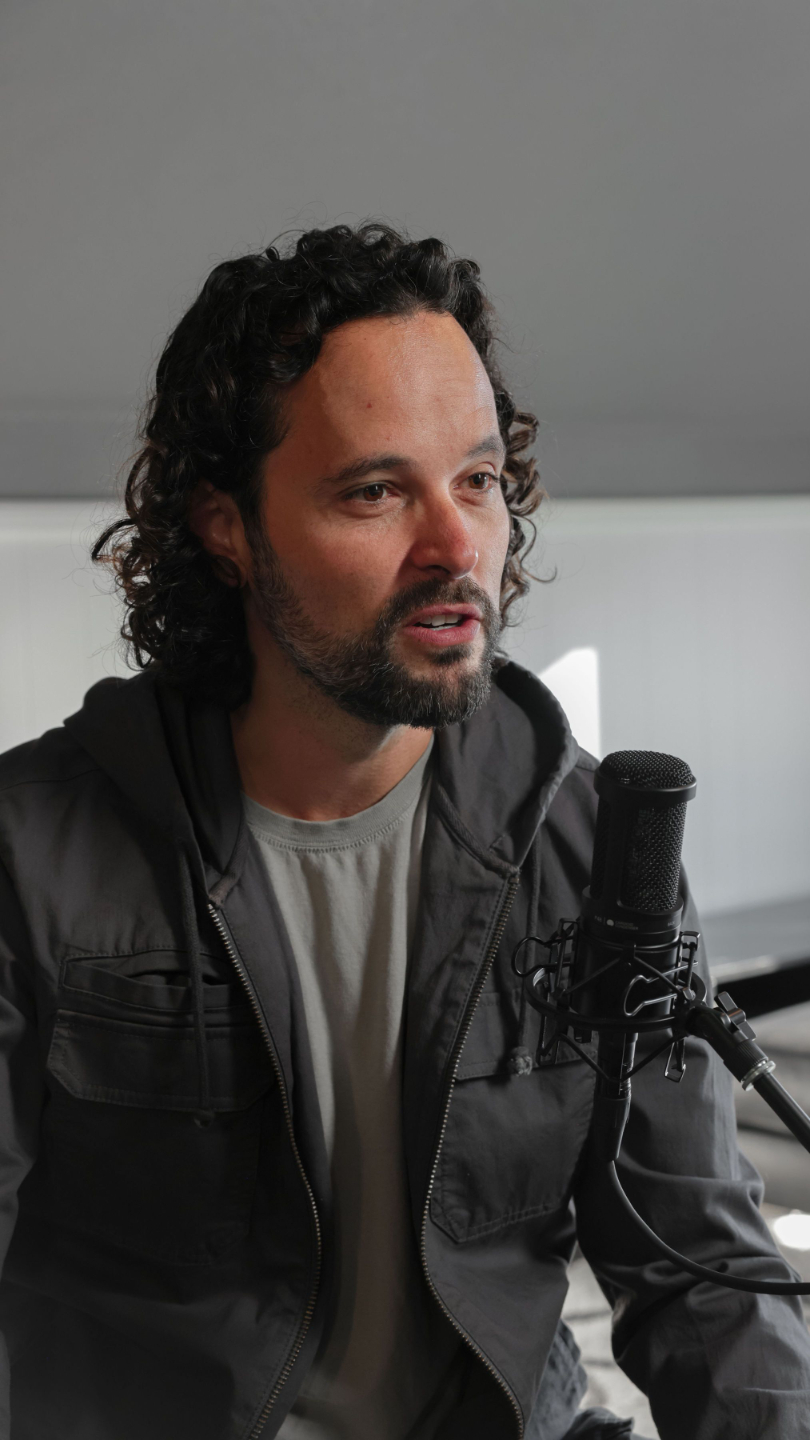Why the Man You Were Taught to Be Isn’t the One Your Marriage Needs
Why Talking About Masculinity Feels So Uncomfortable
Here's something. It seems like everybody has an opinion on: masculinity. Toxic masculinity, this healthy masculinity, that sacred masculinity. Too much, not enough. How do we get here? If even hearing that word makes you tense up or roll your eyes or think, here we go again. I want you to pay attention to that reaction.
Because even if hearing the word masculinity stirs something inside of you, that's the symptom of the very struggle you face in your marriage. If you can't stay grounded in this conversation, how will you stay grounded when your wife brings her complaints or her emotions to you?
Listen, I get it. I was raised with the same traditional messages about what it meant to be a man: logic, stoicism structure, no room for vulnerability. And then I became a firefighter where toughness wasn't just encouraged, it was worshiped.
That made me successful at work, but at home, it left me completely unprepared for the intimacy that my wife was asking for. Here's what I want to share with you today. What most of us were taught about being men will set us up to fail as husbands. As one of my mentors, terry Real says it: what you learned as a boy about being a good man will guarantee you'll be seen as a lousy husband today.
But. There is a way forward. In this episode, we're going to talk about why traditional masculinity leaves men drowning when it comes to intimacy. Why swinging to the other extreme by becoming the sensitive guy doesn't work either. And how to stop giving away your power and instead reconfigure it into wholeness. Strength that includes vulnerability, love, and connection. Plus, we're gonna go over why choosing this path takes courage, and also why it might be the most heroic thing you'll ever do.
So if you're serious about becoming a better husband, don't go anywhere. Stick around. There's something here that could change the way you see yourself and your marriage forever.
Welcome to Better Husband, the podcast that helps you answer the question, how can I be a better husband? I'm Angelo Santiago, a men's marriage and relationship coach, and every week I bring you practical insights to help you strengthen your marriage and become the best husband you can be. Right.
My Story: From Firehouse Strength to Emotional Courage
Let me start off with this.
I grew up with well-meaning parents and role models who taught me what they thought being a man was all about. Be logical, be in control. Keep your emotions in check. Be respectful, and don't make a scene. That wasn't just advice. It was the expectation, the way of being, the roadmap from going from boyhood to manhood and at school with friends in sports.
It was everywhere. It was how I lived every day, and honestly, it worked. It was how I got things done. It was how I got recognition.
It was what got me into a top university and then a top graduate school. And even when I chose to completely change careers and essentially start over, it was my ticket into the fire service.
And when I stepped into the firehouse it got amplified. In the firehouse, masculinity was put on a pedestal. How tough can you be? How much can you handle without flinching? Could you face the worst day of someone's life, even death, and not let it break you? And I could. I was good at it. In a short time, I moved up the ranks.
I promoted to captain. I trained new firefighters, and I led with confidence. That version of masculinity worked in the fire service. It made me respected and it made me successful. But when I walked through the door at home, that same version of masculinity was destructive. I thought being a provider, being strong, being steady would be enough, but it wasn't.
My wife was asking me for something I didn't know how to give. She wanted connection, openness. She wanted me to share what was happening inside of me. And here's the truth. It's not that I didn't know how to share it. I didn't even know how to tap into what was going on inside of me. It was locked up from others and locked up from myself.
I wasn't raised to see vulnerability as strength. I was never taught that intimacy required it. I honestly didn't even realize that was something a marriage needed. My parents seemed to love each other, and I never saw my dad talk about his feelings. I never witnessed my mom ask for more openness from him.
I feared that if I let my guard down, if I showed weakness or tenderness, I wouldn't be the strong man I thought I needed to be. And that fear kept me stuck. It kept me distant from my wife, and it nearly cost me the marriage I now fight for every day. The version of masculinity we were raised with works out there in the world, but at home it leaves us empty handed.
Because what our culture calls being a man doesn't line up with what our wives or our marriages are asking from us. The very traits that got drilled into us as boys, strength, independence, stoicism, invulnerability, those same traits, make intimacy almost impossible. And if you stay locked there, you're going to keep wondering why your wife feels distant.
Why she's frustrated, why she keeps asking for something that sounds foreign to you.
The Three Phases of Masculinity
So let's name it, masculinity hasn't been one straight line. It's moved through different phases, and if you don't understand them, you might keep bouncing between extremes, neither of which will give you the marriage you actually want.
So let's start with the first phase. Traditional masculinity. This is the one most of us grew up in. It's the classic playbook. Be strong, be stoic. Don't cry, don't complain. Handle your business. And here's the core message under all of it, a real man is in vulnerable. The less you feel, the tougher you are, the more of a man you must be. Now that might work. If all you care about is survival. It might get you through the firehouse or the boardroom or the battlefield, but try bringing that home to your wife and see what happens.
Invulnerability is the exact opposite of intimacy. If you can't be seen, if you can't open up, if you can't connect, you can't build closeness, period. Some men tried to break outta that mold and that led to the second phase. The sensitive guy, the new age man.
Open, emotional, vulnerable. Sounds good, right? But here's the problem. A lot of these guys drop their strength in the process. They swung from one half of the equation to the other. Still incomplete. Sensitive, but dependent. Vulnerable but lacking a backbone. And that doesn't work either. Women don't want to carry a man who can't hold his own weight.
And then there's a third phase, reactionary masculinity. This is what we're seeing a resurgence of today. A backlash. Men doubling down on toughness, on control, on dominance. The loud screw you, I'll do what I want, kind of masculinity. And while it may look powerful, underneath, it's the same old fear of vulnerability, the same contempt for intimacy.
So here's where we stand, whether it's the old school tough guy, the overly sensitive guy, or the reactionary alpha male guy, none of those models work if what you want is a real marriage. None of them prepare you for intimacy, accountability, or emotional connection. So if none of those models work, where does that leave us?
The Path to Wholeness: Reconfiguring Power
It leaves us with a different path. A path most men were never shown. A path of becoming whole. This is where I wanna be clear. I'm not asking you to give up your strength. I'm not asking you to lose your edge. What I'm asking you is for you to reconfigure your power. I want you to be powerful and loving and connected and respectful of your partner all at the same time.
Think about that power and love. Strength and vulnerability. Courage and tenderness. Connection and leadership. Walking and chewing gum at the same time. That's the invitation. This isn't about being less of a man. It's about becoming a whole man. One who can show up strong in the world and open at home. One who can still provide and protect, but also connect and nurture.
This is fundamental change. This is transformation. This is something we can all aspire to. To move from traditional masculinity into wholeness means stepping into new territory. It means doing what your father may not have modeled. What your buddies may not understand what the culture at large does not reward.
That's why it feels so uncomfortable. That's why it takes courage, because you're not just learning a few new skills, you're becoming a different kind of man. And here's the good news. You don't have to figure this out on your own.
Most men know something is off. They feel the distance in their marriage.
They feel their wife's disappointment. They feel the weight of it, but they don't know what to do differently. They're drowning in an old script, and that's where the rescue comes in.
There are options out there for you, but you have to be willing to say yes.
You have to be able to admit that you need support, and that doesn't mean you're weak. It means you're honest and you're willing to put in the work to save your marriage. That's what this work is. It's a life raft. Because you've been handed a playbook that doesn't work anymore. Nobody taught you how to be both strong and vulnerable.
Nobody showed you how to hold power with love. So when I hand you this raft, I'm saying there's another way, a better way. But let's be honest, taking hold of it isn't easy. This is something new. It means moving out of step with what your father showed you, outta step with your peers, out of step with the culture at large.
And that's scary. And it's lonely and it's vulnerable, and that's why so many men resist it. But if you take up this challenge, if you choose to step into wholeness, you are doing the most courageous and heroic work of your life. Not firefighter work. Not soldier work, not CEO work. Husband work. Relational work, the kind of work that heals marriages, transforms families, and leaves a legacy your kids will never forget.
Good for you if you're willing to take that step. Good for you if you're grabbing hold of that raft. That makes you a hero in the truest sense of the word, but.
What Happens If You Don’t Change
Let's look at the other option. What happens if you don't take the raft, if you keep clinging to the old version of masculinity?
Here's what I see over and over.
At first, nothing seems urgent. You go to work, you provide, you keep things moving, and you tell yourself, that's enough. Meanwhile, your wife feels alone in the marriage. She feels like she can't reach you, and the gap between you slowly gets wider. You may not notice it at first, but resentment starts to build.
Conversations turn sharp, intimacy fades. You start feeling more like roommates and partners, and one day she tells you she doesn't know if she can do this anymore. That's the cost of staying the same. You might not feel the pain until it's too late, and even if the marriage doesn't end, what do you really have?
A wife who doesn't trust you. Kids who never learned what an emotionally connected father looks like. A life where you stay safe but small.
And let's not just talk about relationships. There's a cost to you too. Carrying invulnerability is heavy. It takes a toll on your body, on your health, on your soul.
Men who live shut down live shorter lives, and that's not just statistics, that's the reality of stress, isolation and hiding. So hear me on this. The risk of staying in old masculinity is greater than the risk of change. You might think it's safer to do nothing, but the truth is doing nothing costs you everything.
And that's why these action steps matter. They may seem small, simple, but they're the start of a new way of living.
If these words are resonating with you. Here's what I want you to do this week.
So let's make this practical.
Four Steps to Start Living as a Whole Man
How do you actually start stepping into wholeness? There are four things you can do this week to start shifting from old masculinity into wholeness. One, reflect on what you've learned. Think about the lessons you've picked up about being a man. Where have they moved you forward in work, friendships or leadership, and where have they held you back, especially in your marriage?
Don't judge it. Just notice it and be honest. Two, admit you might need help. If you want change, stop pretending you can do it alone. Explore what the life raft could look like for you. I'm not saying it has to be me, but it has to be something, a group, a mentor, a coach, a trusted friend. Don't drown when there are hands reaching out for you.
Three, explore your emotions. Just start simple. Mad, sad, glad, afraid. Can you name one of those in your day? If you feel brave, share it with someone, maybe even with your wife, again. Mad, sad, glad, afraid. See when one of those comes up, I And name it. Four, drop the armor when you walk through the door.
If you carry traditional masculinity at work, that's fine for now. Sometimes it's needed, but when you get home, shake it off, leave it outside. Your wife doesn't need the firefighter, the CEO or the soldier. She needs the whole man. Open-hearted, connected, and present.
None of this is about doing it perfectly.
It's just about doing it differently, and every time you practice it, you're breaking from the old script and stepping closer to being the man that your marriage actually needs.
Reflection: Questions to Bring Home This Week
Now take a moment and ask yourself these questions. One, when did I first learn that vulnerability wasn't manly? Who taught me that message directly or indirectly?
Two, how has traditional masculinity helped me succeed in the world, but hurt me at home? Three, which part of wholeness feels most uncomfortable for me right now? Sharing my feelings, asking about hers or using my strengths in a way that connects instead of controls. And four, where in my marriage do I most need the life raft?
Where am I drowning and trying to act like I'm fine? These aren't questions to rush through. Really sit with them and if you want journal about them, if you can. Even better bring one of them into a conversation with your wife this week.
Here's what I want you to leave with today. The old playbook of masculinity will leave you stuck. It may have worked in the firehouse, in the office, or out in the world, but at home it will fail you. The way forward isn't about losing your strength. It's about becoming whole, reconfiguring your power, learning how to be strong and vulnerable, courageous and open, powerful and loving.
That's the man your marriage needs. That's the man your kids need, and that's the man you were meant to be. This isn't easy work. It's out of step with what most men were taught, but that's exactly what makes it heroic. If you're even considering it. You're already started on the journey. And if you know you need to do something but you're not sure what the next step is, here it is.
The Man Your Marriage Actually Needs
Go to better husband secrets.com and watch my free training: the Three Secrets to Becoming a Better Husband Without Endless Therapy, hating the process or pretending to be someone you're not. Inside, I'll show you the skills you need to start shifting this in real time and you'll get a clear picture of what Better Husband Academy is all about, a community where men are doing this work together every single week.
You don't have to figure this out alone. If you've been waiting for your life raft, this is it. Go to better husband secrets.com or click the link in the show notes and get started. Now, thanks for sticking with me through this episode. I hope you got something out of it. Send me an email or leave a comment so I know what really landed for you.
I'm Angelo Santiago. You're listening to Better Husband, and I'll see you on the next one.







